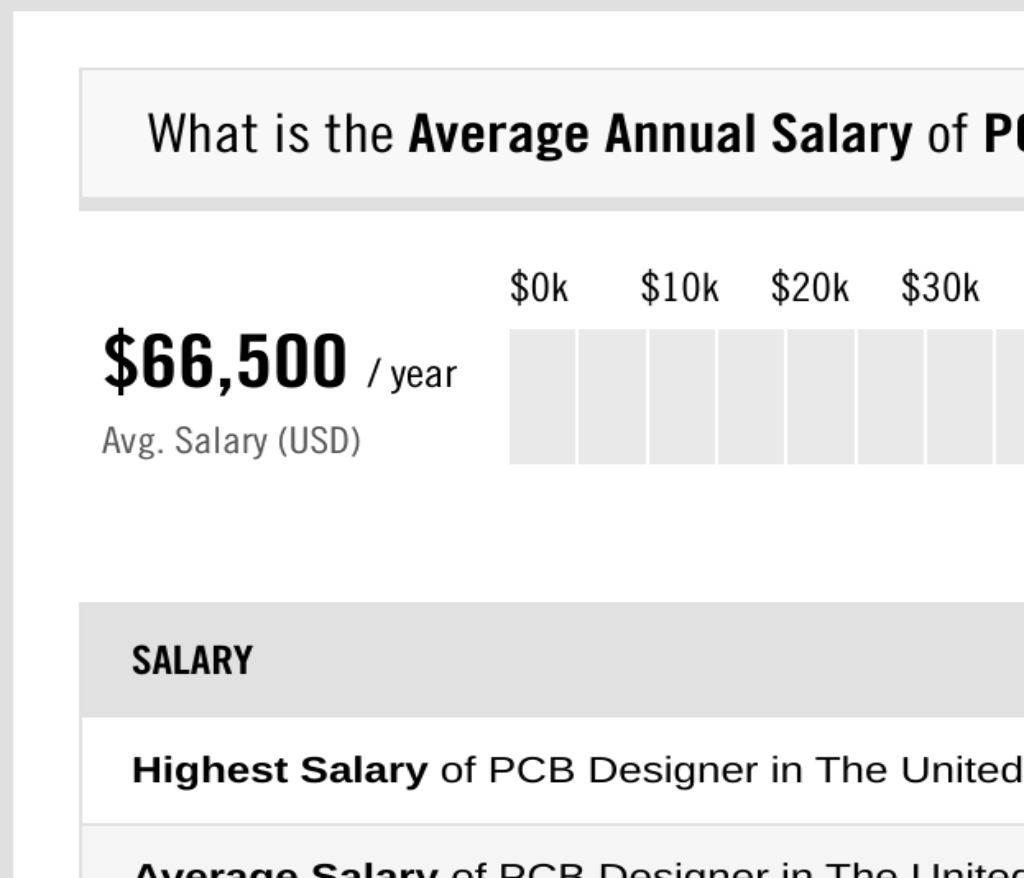What is the salary of a PCB designer?
A PCB (printed circuit board) designer is responsible for designing and laying out printed circuit boards. This involves creating schematics, selecting components, defining connectivity, and laying out PCBs ready for manufacture. As an essential role in the electronics industry, what is the typical salary for a PCB designer?
PCB Designer Salary Overview

The average salary for a PCB designer in the United States is $74,297 per year, or $35.72 per hour. However, salaries can range widely depending on factors like:
- Years of experience
- Location
- Industry
- Company size
Some experienced PCB designers can earn $90,000 a year or more.
Average PCB Designer Salaries By Years of Experience
| Years of Experience | Average Salary |
|---|---|
| 1-4 years | $59,000 |
| 5-9 years | $72,000 |
| 10-19 years | $83,000 |
| 20+ years | $93,000 |
Entry-Level PCB Designer Salary
Entry-level PCB designers just starting out can expect to earn salaries in the range of $40,000 – $65,000 per year. With 1-4 years experience under their belt, average PCB designer salaries are around $59,000.
Many junior designers start out as engineering assistants or junior engineers before specializing in PCB layout and design. Internship experience can also help secure those initial roles to get some experience.
Mid-Level PCB Designer Salary
With 5-9 years of experience, the average salary for PCB designers rises to around $72,000. Some variation exists depending on specialization – such as RF PCBs or high-speed digital designs.
Additional skills and certifications also boost salaries at this mid-career point. Some examples include:
- IPC certified designer
- High frequency and signal integrity training
- Management or team lead experience
- Knowledge of layout software like Altium, Cadence Allegro, and Mentor Xpedition
Senior PCB Designer Salary
The most experienced PCB designers command the highest salaries. With 10-19 years experience, salaries average around $83,000. For senior designers with 20+ years under their belt, average earnings are around $93,000.
These experienced designers have advanced skills and carry more responsibility such as:
- Overseeing complex design projects
- Leading teams of more junior designers
- Sign off authority on designs
- Developing design guidelines and layout techniques
- Strong communication and collaboration abilities
- Layout skills with multiple PCB software tools
The highest paid senior PCB designers working for technology companies in regions like Silicon Valley can earn $115,000 a year or more.
Salary by Location
Location impacts salaries significantly for PCB designers and engineers. Areas with a high concentration of electronics and technology companies typically offer higher compensation.
Average Annual PCB Designer Earnings By Location
| Metro Area | Average Salary |
|---|---|
| San Jose-Sunnyvale-Santa Clara | $99,000 |
| San Francisco | $92,000 |
| Boston | $90,000 |
| Huntsville | $83,000 |
| Dallas-Fort Worth | $77,000 |
| National Average | $74,297 |
PCB designers working in top markets like Silicon Valley (San Jose metro area), San Francisco, and Boston earn nearly $25,000 above the national average. Tech hub cities and regions with defense contractors also offer higher than typical salaries.
On the other end of the scale, lower CoL areas through the Midwest and South have lower average salaries for PCB roles, in the range of $65,000 – $75,000 annually.
Salary by Industry
In addition to location, the industry a PCB designer works in impacts their earning potential. Industries like aerospace, defense, computers, and other cutting-edge electronics tend to pay better than more cost-focused manufacturing fields.
Average PCB Designer Salary By Industry
| Industry | Avg Salary |
|---|---|
| Aerospace & Defense | $86,000 |
| Telecommunications | $83,000 |
| Computers and Peripherals | $80,000 |
| Scientific and Technical Services | $78,000 |
| Navigation, Measurement, Control | $77,000 |
| Electronics Manufacturing | $75,000 |
| National Average | $74,297 |
Fields like defense, aerospace, tech services, and advanced electronics manufacturing offer salaries as much as $10-15k above average. More commoditized electronics manufacturing and cost-focused industries pay closer to or sometimes below the median salary level.
Company Size Effect on Salary
Beyond just industry, the size of the company a PCB designer works for also influences their total compensation. In general, large global corporations have the resources to pay above-average salaries. Small engineering firms and manufacturers paying below market rates is also common.
Average PCB Designer Salary by Company Size
| Company Size | Avg Salary |
|---|---|
| 5000+ emp | $82,000 |
| 1000-4999 | $77,000 |
| 500-999 | $74,000 |
| 50-499 | $68,000 |
| <50 | $62,000 |
While specific salaries depend on many factors, in broad terms larger enterprises pay their designers approximately 10-15% more than small businesses. And global publicly traded companies offer some of the highest salaries.
But other considerations like work-life balance, culture, and opportunities for career growth also factor into overall job satisfaction and compensation value – not just direct salary levels.
Salary Growth Trajectory
Over the length of their careers, experienced PCB designers see respectable salary growth. Both expanded responsibilities and inflation adjust salaries higher over time.
Typical earning trajectories align to the following ranges:
Typical Career Earnings Growth for PCB Designers
| Years Experience | Typical Salary Range |
|---|---|
| 1-4 years | $40,000 – $65,000 |
| 5-9 years | $60,000 – $85,000 |
| 10-19 years | $75,000 – $95,000 |
| 20+ years | $85,000 – $115,000 |
With every few years added experience, average salaries for PCB designers tend to increase by $5k-$10k. After a decade or more specialty experience, some designers can earn over $100k annually.
But to reach the high ends of these ranges requires developing well rounded skills. This includes communication abilities, engineering knowledge, layout proficiencies, team leadership capabilities, and maybe additional certifications. Peak earning power goes to those willing to continuously build on their expertise.
Factors That Influence Salary
Many variables beyond simplistic measures like years of experience play into actual PCB designer salary levels. A few top factors include:
Key Factors Influencing PCB Designer Salaries
- Years of specialty experience in PCB layout & design
- Location – Cost of living and tech industry concentration
- Actual skill level and abilities
- Communication and collaboration skills
- Industry and company size
- Level or responsibility and leadership
- Continuing education and certifications
Accounting for all these elements provides more insight than any single factor alone. For example, a highly skilled principal PCB designer at an aerospace company in Seattle likely earns far more than a entry-level designer at small manufacturer in the Midwest. Though both may have 5 years experience, specialty skills and companies willing invest more achieve higher compensation.
Understanding salary ranges takes balancing all relevant variables – not just looking narrowly at something like years worked. Value depends on abilities applied within certain industries and regions.
Projecting Future Salary Growth
According to the U.S. Bureau of Labor Statistics (BLS), demand for electrical and electronics engineering technicians (including PCB designers) will grow 7 percent from 2020 to 2030. That tracks slightly below average for all occupations nationally.

But within the appropriate industries and geographies, skilled PCB designers remain in demand to help create innovative products. Particularly as devices become more electronically complex. Specialization in high speed layout, signal integrity, prototyping, and similar skills boost employment options.
Experience also creates opportunities to transition into team leadership, principal design, or even engineering management roles. Salaries for managerial positions often range from $115k-$145k annually.
So while overall national demand projections remain moderate, practiced PCB designers focused on developing expertise still have excellent compensation and advancement potential within the profession. Particularly in the most technology focused regions and industries.
Job Satisfaction and Benefits
Beyond direct salary earnings, job satisfaction and employment benefits also contribute to desirability of PCB design careers.
Most PCB designers enjoy their work creating layouts, solving design challenges, and seeing their creations manufactured. And benefits at many technology companies are also generous, sometimes including:
- 80-100% health insurance premium coverage
- 401K matching contributions
- Profit sharing or stock grants
- Generous paid time off allowances
- Flex scheduling options
- Training & development investments
- Bonuses or incentive pay
With competitive salaries reaching $100k+ in some cases, plus ample benefits, PCB design offers very good compensation potential. Especially for professionals who continuing building expertise over the long run in sought after design specializations.
FAQ About PCB Designer Salaries
Here are answers to some frequently asked questions about the earning potential of PCB designers and associated careers:
How much do entry level PCB designers make?
Most entry-level PCB designers make between $40,000 – $65,000 annually as they begin the profession. College internships or roles as engineering assistants help gain initial experience too.
What qualifications boost PCB designer salary levels?
Higher salaries go to those with sought after skills such specialty layout techniques, complex design knowledge, prototyping abilities, team leadership experience, and communication abilities. Developing expertise beyond just layout tools helps progress pay.
Can PCB designers earn over $100k a year?
Yes, experienced PCB designers at leading technology companies can make over $100k in high cost of living metro areas. Principal designers, engineering managers, and directors with 20+ years experience also sometimes exceed this compensation level at global corporations.
Which industries pay PCB designers the most on average?
High tech industries including aerospace, defense, computing, and communications offer salaries $5k-$15k above average. Most other fields pay reasonably comparable levels, though commoditized manufacturing does sometimes fall slightly below median earnings.
Do PCB designers receive additional employment benefits?
Yes, most have access to typical professional level benefits that supplement direct pay. These sometimes include 401k plans, health/dental coverage, incentive bonuses, stock options, disability protection, life insurance, and generous vacation time.




